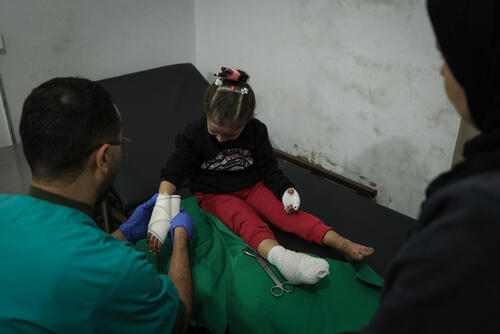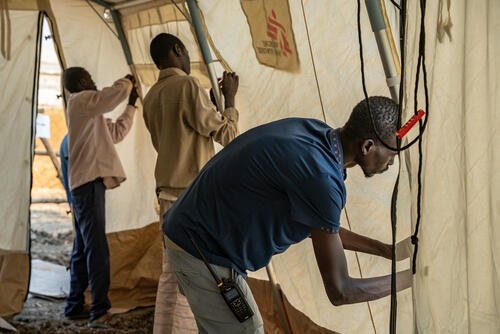Renewed clashes in the Haitian capital of Port-au-Prince involving various armed groups —including United Nations Stabilization Mission in Haiti (Minustah) forces— has brought an abrupt end to the short respite from violence in the city since elections in February.
In July 2006, Médecins Sans Frontières (MSF) treated more than 200 gunshot victims at three medical facilities in Port-au-Prince: St. Joseph's trauma center in the Turgeau neighborhood, St. Catherine hospital in Cité Soleil, and Jude Anne Hospital in the Delmas area. This represents a 110 percent increase from gunshot-related admissions in June.
"This level of violence is extremely high, even for a city of two million," said Yann Libessart, head of mission for the MSF trauma center at St. Joseph's Hospital in the city's center. "Our medical and surgical teams treated 37 gunshot victims in the 48-hour period after clashes on July 20 and 21."
Since December 2004, more than 5,000 people were admitted to MSF hospitals for violence-related injuries, including more than 2,500 gunshot victims and 1,500 stabbing victims.
"Every day we can hear gunshots in the city," said Petra Reijners, head of mission for MSF's Jude Anne hospital. "Civilians from an increasing number of neighborhoods in Port-au-Prince are forced to live in a state of constant fear. They are scared of being hit by a stray bullet. Our program in Jude Anne Hospital, designed to provide free emergency obstetric care, had to admit ten patients suffering from gunshots wounds in July."
In the past weeks, MSF also visited four sites in the city where residents fled following the latest upsurge in violence. One mother of seven children in her mid-twenties, who was recently forced to leave her home, told our teams: "Armed groups started shooting at a lot of people and everybody had to run. They killed my husband, they burned our house. I don't know why they are doing this. I don't know where to go," she said.
In this context of widespread violence, respect for the safety of civilians remains a major concern for all MSF medical teams.
"In our facilities in Cité Soleil, we treated a majority of women and children who had been caught in the crossfire", said Loris De Filippi, head of mission for the 78-bed St. Catherine hospital in Cité Soleil.
"Due to the uncertainty of the situation, we had to take the difficult decision of closing temporarily our primary health center in Chapi. However we will keep St. Catherine hospital’s emergency services working within Cité Soleil 24 hours a day."
"While it's hard to predict, we are worried that the recent resumption of heavy fighting in Port-au-Prince will get worse before it gets better," said Reijners.
MSF has been working in Haiti since 1991. In Port-au-Prince, MSF now operates four medical centers. The 78-bed St. Catherine hospital in Cité Soleil provides emergency care to victims of violence, carries out a monthly average of 4,000 primary health care consultations, and admits 100 patients each month.
MSF provides emergency trauma care at the St. Joseph Hospital and runs a 48-bed physical rehabilitation center in the Pacot area.
Since its opening in March 2006, the 60-bed Jude Anne hospital has assisted in nearly 2,000 deliveries and conducted more than 10,000 pre- and post-natal consultations, and set up a program of prevention of mother-to-child transmission of HIV. In Petite Rivière de l’Artibonite, MSF supports local health structures.





